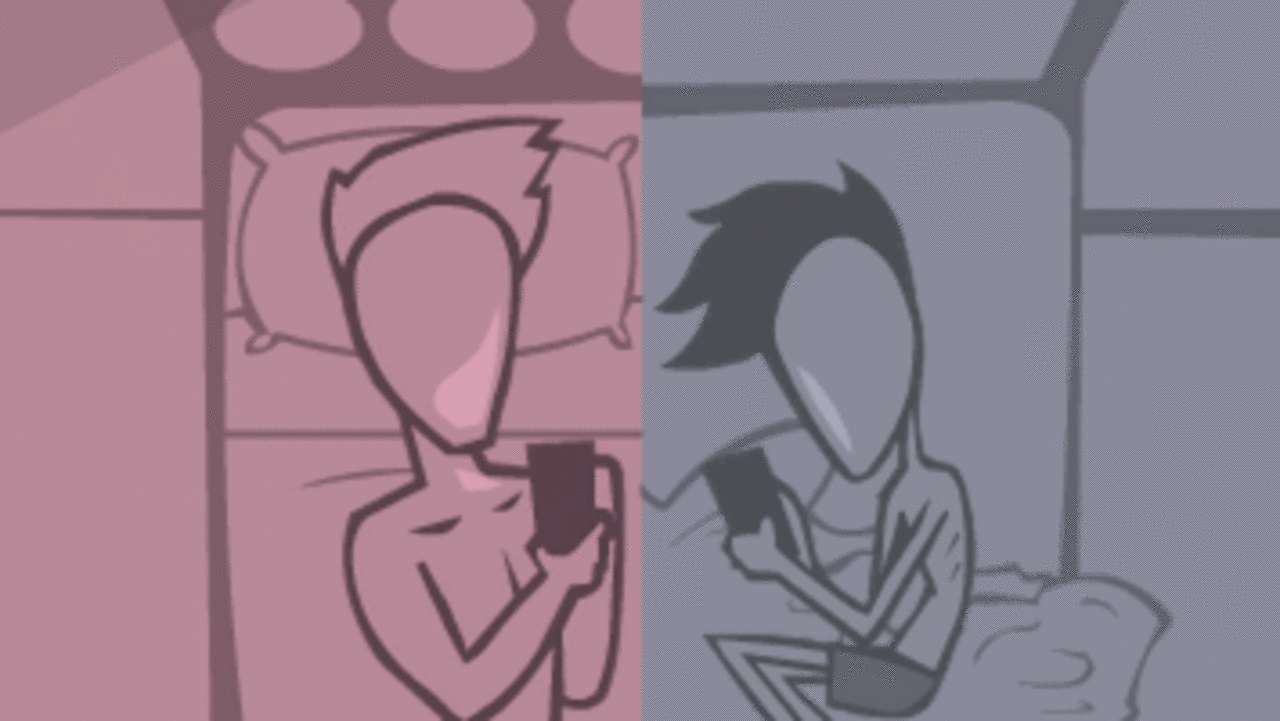I’m sitting at my dining room table, staring at my mother. The plates of food in front of us are getting cold, but my mouth is dry.
“Mom, there’s something I have to tell just you.”
“Hold on, Nicky, I haven’t asked you about your day yet!”
And she’s off, asking about my grades—don’t I know how terrible my Chemistry grades have been?—before I can even get a word in edgeways. The cat-clock mounted on the wall sweeps its eyes left and right, as mom lays into me about studying, and why do I spend so much time with that guy, Jack? He’s a bad influence, she tells me.
Every hour, the cat-clock lets out a cacophony that could wake the dead. Why the hell do we keep that stupid thing? Oh right (I can hear mom’s voice in my head already), grandfather gave it to us. Never mind that it’s an annoying piece of kitsch—family comes first. Well, that or studying.
I try my best to look bored, hands folded in front of me at the table, waiting for dad to get home. Picture of nonchalance. But upstairs in my room there’s a text on my phone from Jack. “Tell them about us,” he says to me. “Tonight.”
 Let’s get this out of the way first— I’m a straight dude, and I’ve never experienced coming out to anyone. That being said, when Coming Out Simulator 2014 showed up on our list of games to review, I dove in, and immediately put myself forward to review it.
Let’s get this out of the way first— I’m a straight dude, and I’ve never experienced coming out to anyone. That being said, when Coming Out Simulator 2014 showed up on our list of games to review, I dove in, and immediately put myself forward to review it.
Sure, I’ve never had to come out, but I’ve also never had to fight in a war, flown a plane, or joined a gang of illegal street racers. Games give us an interactive experience of something we might otherwise never get the chance to do, and I wanted to challenge myself. How would I feel, I wondered, if I had to tell my parents that I was something they didn’t understand?
Coming Out Simulator 2014 was created by Nicky Case (not yet the author’s legal name, we’re told) as a pseudo-autobigraphical text adventure of how Case came out to his parents. Case submitted the game to the #Nar8 Game Jam, and ever since it’s been picking up coverage for its honest depiction of the awkwardness of being a gay teen.
Playing through Coming Out Simulator 2014, I decided I would make the choices I could see myself making, that I would choose dialog options that were as close to my own voice as they could be.
My plan quickly went straight out the window, however. I soon realized that as familiar as Nicky’s home might seem, these were not my parents, and the options I would have chosen would not see me through. I was on shaky ground.
The game is told entirely through iPhone speech bubbles, something that makes a lot more sense when played on a mobile device, since the game is formatted around a smart-phone screen. From a purely mechanical standpoint, the fact that there’s no way to scroll back up to previous speech bubbles is a bit tricky—you sometimes have to read each new line of dialogue a little faster than you’d like. The game’s sound effects, also, can be a little distracting. But believe us, the written dialogue will give you plenty to think about.
What I liked about the game’s format the most, however, is that it feels accessible to kids who might not otherwise have any reference for how to come out. One can well imagine kids who aren’t ready to come out playing through the  game on their phone or tablet, away from prying eyes—not unlike Nicky Case in the game’s opening. Case left the game open source and un-copyrighted- “I’m as open with my source code as I am with my sexuality,” he explains in the “About This Game” section. To that end, Case has taken great inspiration from Dan Savage’s It Gets Better campaign, offering up their own experience of coming out as queer as a roadmap through what is often an incredibly difficult time.
game on their phone or tablet, away from prying eyes—not unlike Nicky Case in the game’s opening. Case left the game open source and un-copyrighted- “I’m as open with my source code as I am with my sexuality,” he explains in the “About This Game” section. To that end, Case has taken great inspiration from Dan Savage’s It Gets Better campaign, offering up their own experience of coming out as queer as a roadmap through what is often an incredibly difficult time.
To that end, Coming Out Simulator narrowly avoids two major pitfalls. First, the game runs the risk of coming off as narcissistic (something Case casually jokes about in the “About Me” section), or an attempt at self-deprecation. Secondly, Case’s project could easily have gone the other direction - becoming a “how-to” guide for love and acceptance—helpful no doubt to some, but not useful for LGBT kids trying to come out in a hostile environment.
Instead, Coming Out Simulator forces the player to make the hard decisions for themselves—do you yell “Mom, Dad, I’m Bi!” at the top of your lungs, or do you quietly nod and chew at your dinner, pretending to go along with their plan to set you up with your girl-next-door chemistry tutor? The game’s greatest strength comes from its ability to turn Case’s experience inside-out so that it becomes your experience.
Indeed, what makes Coming Out Simulator worth playing - even for someone, like me, who has never had to come out - is that it is indefinitely relatable. It reminds us that, beneath all the waxing poetic about teenage rebellion, growing up is really damn hard, and some “rebellions” affect the course of a person’s life.
“A lot of the dialogue [consists of] things my mother actually said, such as ‘Don’t let the gays recruit you’” Case told Polygon recently, and it shows; the characters in the game are believable and feel like real people, with all the same flaws and foibles that make up a person’s personality.
It’s to Case’s credit as a writer that the game doesn’t pull any punches with the subject matter. As much as this is Case’s story about coming out (and the phrase ‘autobiographical’ really takes on a new meaning here), it is also a story about violence, emotional abuse, and the hard price of growing up. I’ve recommended the game to a few folks who have had to come out, and their reactions to the game were far more immediate and visceral than mine, but you’d need to have a heart of stone to not be touched by the title regardless of your sexuality.
Coming Out Simulator 2014 isn’t just a coming-out story. It’s a lesson about how one sudden event can entirely change the anatomy of the family unit. It’s also a game about the cost of family, and ultimately, love. That’s something I can understand.



